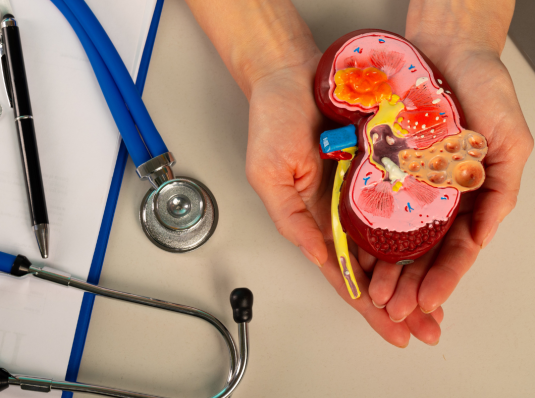Chronic Kidney Disease (CKD)

What is Chronic Kidney Disease?
Chronic Kidney Disease (CKD) is a long-term condition where the kidneys gradually lose function over time, leading to the buildup of waste and fluid in the body. CKD can progress to end-stage kidney disease, requiring dialysis or a kidney transplant.
Symptoms of Chronic Kidney Disease May Include:
- Fatigue or weakness
- Swelling in the ankles, feet, or hands
- Changes in urination (frequency, color, or amount)
- Shortness of breath
- Nausea or vomiting
- High blood pressure
Facts About Chronic Kidney Disease
- CKD affects more than 37 million Americans, with many unaware they have the condition.
- It is more common in people over 60 and those with diabetes or high blood pressure.
Who is at Risk for Chronic Kidney Disease?
Risk factors for chronic kidney disease may include:
- Genetics: A family history of kidney disease increases the risk.
- Sex: CKD is slightly more common in women, but men are more likely to progress to end-stage kidney disease.
- Age: The risk of CKD increases with age, particularly after 60.
- Race or Ethnicity: African Americans, Hispanics, and Native Americans have higher rates of CKD.
- Other Risk Factors: Diabetes, high blood pressure, heart disease, and obesity are major contributors to CKD.
How Many Americans Have Chronic Kidney Disease?
More than 37 million American adults have CKD, and many more are at risk due to underlying health conditions like diabetes and hypertension.
Diagnosis & Management
CKD is diagnosed through blood tests (to measure creatinine and glomerular filtration rate), urine tests, and imaging studies. Early detection and management can slow the progression of the disease.
Treatment Options for Chronic Kidney Disease
Medical and Pharmaceutical Treatments
- Medications: Blood pressure medications, diabetes management, and medications to reduce proteinuria are commonly used in CKD management.
- Dialysis: For advanced CKD, dialysis may be necessary to filter waste from the blood.
- Transplant: Kidney transplant is the most definitive treatment for end-stage kidney disease.
Lifestyle Interventions
- Dietary Changes: A diet low in sodium, potassium, and phosphorus is crucial for managing CKD.
- Exercise: Regular physical activity helps control blood pressure and improve overall health.
- Smoking Cessation: Quitting smoking slows the progression of CKD.
Have You Been Diagnosed with Chronic Kidney Disease?
At Clinical Investigation Specialists, Inc. (CIS Research), our mission is to advance medical care for adults through innovative clinical research. You may be an eligible candidate for a clinical trial researching treatment options. For more information on currently enrolling clinical trials, click here.
Resources
- Chronic kidney disease (CKD) - Symptoms, causes, treatment | National Kidney Foundation
- Chronic Kidney Disease Basics | Chronic Kidney Disease | CDC
Find A Clinical Research Study
CIS does not provide medical advice, diagnosis or treatment. The content provided is for informational purposes only.
Back To Health Education